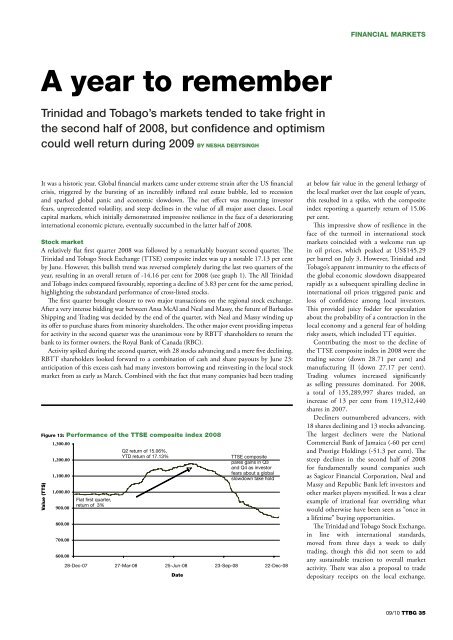The Trinidad & Tobago Business Guide (TTBG, 2009-10)
- No tags were found...
You also want an ePaper? Increase the reach of your titles
YUMPU automatically turns print PDFs into web optimized ePapers that Google loves.
FINANCIAL MARKETS<br />
A year to remember<br />
<strong>Trinidad</strong> and <strong>Tobago</strong>’s markets tended to take fright in<br />
the second half of 2008, but confidence and optimism<br />
could well return during <strong>2009</strong> By Nesha Debysingh<br />
It was a historic year. Global financial markets came under extreme strain after the US financial<br />
crisis, triggered by the bursting of an incredibly inflated real estate bubble, led to recession<br />
and sparked global panic and economic slowdown. <strong>The</strong> net effect was mounting investor<br />
fears, unprecedented volatility, and steep declines in the value of all major asset classes. Local<br />
capital markets, which initially demonstrated impressive resilience in the face of a deteriorating<br />
international economic picture, eventually succumbed in the latter half of 2008.<br />
Stock market<br />
A relatively flat first quarter 2008 was followed by a remarkably buoyant second quarter. <strong>The</strong><br />
<strong>Trinidad</strong> and <strong>Tobago</strong> Stock Exchange (TTSE) composite index was up a notable 17.13 per cent<br />
by June. However, this bullish trend was reversed completely during the last two quarters of the<br />
year, resulting in an overall return of -14.16 per cent for 2008 (see graph 1). <strong>The</strong> All <strong>Trinidad</strong><br />
and <strong>Tobago</strong> index compared favourably, reporting a decline of 3.83 per cent for the same period,<br />
highlighting the substandard performance of cross-listed stocks.<br />
<strong>The</strong> first quarter brought closure to two major transactions on the regional stock exchange.<br />
After a very intense bidding war between Ansa McAl and Neal and Massy, the future of Barbados<br />
Shipping and Trading was decided by the end of the quarter, with Neal and Massy winding up<br />
its offer to purchase shares from minority shareholders. <strong>The</strong> other major event providing impetus<br />
for activity in the second quarter was the unanimous vote by RBTT shareholders to return the<br />
bank to its former owners, the Royal Bank of Canada (RBC).<br />
Activity spiked during the second quarter, with 28 stocks advancing and a mere five declining.<br />
RBTT shareholders looked forward to a combination of cash and share payouts by June 23:<br />
anticipation of this excess cash had many investors borrowing and reinvesting in the local stock<br />
market from as early as March. Combined with the fact that many companies had been trading<br />
Figure 13: Performance of the TTSE composite index 2008<br />
at below fair value in the general lethargy of<br />
the local market over the last couple of years,<br />
this resulted in a spike, with the composite<br />
index reporting a quarterly return of 15.06<br />
per cent.<br />
This impressive show of resilience in the<br />
face of the turmoil in international stock<br />
markets coincided with a welcome run up<br />
in oil prices, which peaked at US$145.29<br />
per barrel on July 3. However, <strong>Trinidad</strong> and<br />
<strong>Tobago</strong>’s apparent immunity to the effects of<br />
the global economic slowdown disappeared<br />
rapidly as a subsequent spiralling decline in<br />
international oil prices triggered panic and<br />
loss of confidence among local investors.<br />
This provided juicy fodder for speculation<br />
about the probability of a contraction in the<br />
local economy and a general fear of holding<br />
risky assets, which included TT equities.<br />
Contributing the most to the decline of<br />
the TTSE composite index in 2008 were the<br />
trading sector (down 28.71 per cent) and<br />
manufacturing II (down 27.17 per cent).<br />
Trading volumes increased significantly<br />
as selling pressures dominated. For 2008,<br />
a total of 135,289,997 shares traded, an<br />
increase of 13 per cent from 119,312,440<br />
shares in 2007.<br />
Decliners outnumbered advancers, with<br />
18 shares declining and 13 stocks advancing.<br />
<strong>The</strong> largest decliners were the National<br />
Commercial Bank of Jamaica (-60 per cent)<br />
and Prestige Holdings (-51.3 per cent). <strong>The</strong><br />
steep declines in the second half of 2008<br />
for fundamentally sound companies such<br />
as Sagicor Financial Corporation, Neal and<br />
Massy and Republic Bank left investors and<br />
other market players mystified. It was a clear<br />
example of irrational fear overriding what<br />
would otherwise have been seen as “once in<br />
a lifetime” buying opportunities.<br />
<strong>The</strong> <strong>Trinidad</strong> and <strong>Tobago</strong> Stock Exchange,<br />
in line with international standards,<br />
moved from three days a week to daily<br />
trading, though this did not seem to add<br />
any sustainable traction to overall market<br />
activity. <strong>The</strong>re was also a proposal to trade<br />
depositary receipts on the local exchange.<br />
09/<strong>10</strong> <strong>TTBG</strong> 35


















